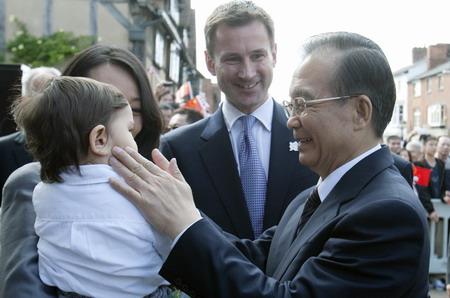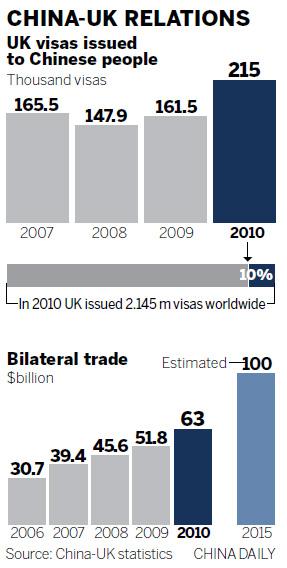
Premier Wen Jiabao greets Jack Hunt, the son of British Secretary of State for Culture, Olympics, Media and Sport Jeremy Hunt (center), during a visit to William Shakespeare's birthplace in Stratford-upon-Avon in Britain on Sunday. [Photo / Associated Press]
LONDON - While national leaders usually kick off their visits to the UK in the capital city, Premier Wen Jiabao decided to start his in Birmingham, instead of London.
In addition to seeing Stratford-upon-Avon on Sunday, the birthplace of the famed writer William Shakespeare, Wen spent his time in the Birmingham area visiting the Chinese-owned MG Motor UK plant at Longbridge where he attended the launch of the new MG6 Magnette sedan.
The arrangement highlights the importance of trade and investment in the Sino-British relationship.
 Analysts say the success of the MG plant will be significant in the future of ties between the countries.
Analysts say the success of the MG plant will be significant in the future of ties between the countries.
"Since many people attach emotional significance to national automobile industries as a source of national pride, the fact that Shanghai Automotive owns MG has a lot of symbolic importance," said Tom Kane, a senior lecturer in international politics at Britain's University of Hull.
"If the two companies can convince British people to see this as an example of Chinese investors creating jobs for Britain, the visit may promote a friendlier reception and perhaps friendlier government policy for future Sino-British cooperation."
Wen was the second high-ranking Chinese official to visit the MG plant at Longbridge. The Party chief of Shanghai, Yu Zhengsheng, went there in April.
Local media in Birmingham and trade experts were happy that Wen chose Longbridge to start his fourth UK visit and hear him call the arrangement "symbolic of China's deep interest" in the region's economy.
Hopes are high that it could "spell further investment and job creation in the West Midlands by the economic superpower", the Birmingham Post commented.
Chinese trade has been "hugely important" to Birmingham during the past decade and the city is the biggest recipient of investment from China outside London, having received 76.6 million pounds ($122.2 million) since 2003 from Chinese investors' backing firms including MG Motor UK and Birmingham City Football Club, the paper said.
It also quoted former British trade minister Lord Digby Jones as saying Wen's visit could be key to attracting further investment from China.
"This will reinforce Birmingham's place on the global map," he said.
But Liu Xiaoming, China's ambassador to the UK, last week urged the UK to be more open if it wants to attract Chinese investors.
Kane responded by saying the British government "normally tries to institute policies which will encourage people from abroad to do business in Britain".
The UK has suffered during an ongoing economic crisis and, while its markets have rallied to excessive levels in 2010 and early 2011, they may be in a process of correction, he said.
"In principle, Chinese investors ought to be able to find opportunities in the UK, especially toward the end of the year."
Not just about businessAlthough there is little doubt that business, trade and investment are the most important components of the relationship between the two countries, Sino-British relations today extend much farther than business-to-business ties.
At the end of his visit to the UK on Monday, Wen will meet British Prime Minister David Cameron and witness the signing of deals in areas including resources, transportation and finance.
Thomas Renard, a research fellow at the Royal Institute for International Relations, an independent think tank based in Brussels, said the two countries are "important partners in education".
Roughly 120,000 Chinese students are studying in the UK.
Renard also said the UK is "an important strategic partner for China for various reasons".
The UK enjoys "special ties" with China's Asian neighbors India and Pakistan, he said, adding that the UK also has a "special relationship with the still global superpower, the United States".
Renard also pointed out that the UK is still a "global power" - "although largely limited in the 21st century" - "in the form of its financial and economic power and its military projection power and its power of attraction, in terms of business and education, notably".





